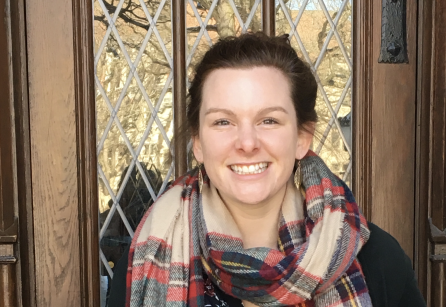News
Profile: Chelsea Cornelius
April 1, 2020

Chelsea Cornelius set off for her first year at the University of Chicago Divinity School with the notion of immediately pursuing a PhD after earning a Master of Divinity degree.
But along the way, the class of 2019 MDiv student learned a few things about herself. As part of the ongoing field education requirement in the MDiv program, Cornelius worked last summer as a chaplain at a hospital in Madison, Wisconsin, first in the neonatal intensive care unit and then in the psychiatric unit.
“To be in a role like that, where you can offer some sense of support or presence or acknowledgment of grief, is a real gift,” Cornelius says. “I loved it, and I’m looking forward to doing it again.”
Cornelius, who is preparing to be ordained in the Presbyterian Church, says she still expects to pursue a doctorate eventually, probably on the intersection of feminist theology and trauma theory, but in the near future at least, she is drawn to chaplaincy work in a clinical setting.
“I came into the Master of Divinity program thinking I’m going to be a serious scholar, and I’m still going to do those things,” Cornelius says, “but I also very much have a capacity and an interest in tending to the actual lives of people, especially those in really vulnerable situations.”
Her open-ended journey seems fitting for someone whose story defies pigeonholing: Cornelius grew up in a “strong family of thoughtful atheists” in northern Wisconsin, she says, “and still I had a fascination of religion and religious studies from a young age.”
She majored in religious studies and philosophy as an undergrad at the University of Wisconsin-Madison. At the same time, breaking from family tradition, she became a Presbyterian.
After earning a BA in 2015, she worked as an associate in campus ministry in Madison while applying for master’s programs at the country’s leading divinity schools.
All of the programs accepted Cornelius, she says, but the University of Chicago always came out on top in her deliberations, both for practical reasons – her partner lives and works in Madison – and for her intellectual and academic priorities.
She was drawn to the school’s curriculum, which is rigorous for students across the degree programs, regardless of whether or not they intend to go into academia.
“I wanted to be trained not only as a religious practitioner but as an academic and as a person who can stand in both worlds, and to do so with the same amount of care and attention,” Cornelius says.
The care and attention she herself has received from Divinity School staff and faculty have helped sustain her, she says, beginning with her correspondence with the then dean of students, Theresa Hord Owens, while Cornelius was still weighing her options. In addition, Cornelius says, Cynthia Lindner, the director of Ministry Studies, as well as the rest of the administrative staff, “really shepherded along the program in a way that is just so skilled and so careful.”
The camaraderie and the rigorous intellectual discussions among the dozen students who make up the MDiv class of 2019 have created an additional source of support over the years, Cornelius says. Such a bonus is hardly inconsequential in academia, where the scholarly pressures can be isolating.
Her faith has remained firm during her time at the Divinity School, according to Cornelius. But the experience has helped her clarify and communicate her identity and religious tradition alongside people from all walks of life, she says.
Her studies and training have helped her learn “what it means for me to be a Presbyterian lesbian feminist who is also [an] academic,” Cornelius says, and what it means “to be in a conversation in a space where not everybody has those identities.”

